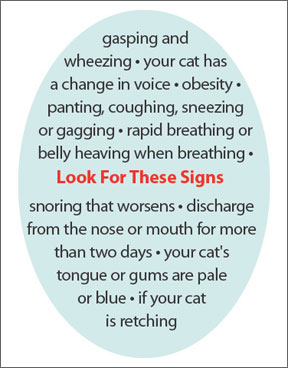If you think snoring partners are bad, consider this: Iris Hunter, 53, from Durham, North Carolina has five cats. The youngest is three and the oldest of the crew is 17. All are domestic short-hairs, with three tabbies among them. And, unfortunately, all of them snore.
“At first I thought it was my husband,” says Iris, but the snoring actually came from her cats. Snoring pets may bring just as many laughs as snoring spouses, but neither is all that funny. As with

Bev Caldwell
288
humans, snoring in cats can cause sleep deprivation for those who hear it – and is sometimes a sign of serious illness for the snorer.
Stats on Snoring Cats
According to a study conducted by the Sleep Disorders Center of the Mayo Clinic, a majority of people allow their pets – cats and dogs – to sleep with them in bed at night. Those bed-sharing patients surveyed reported that 21 percent of their dogs and seven percent of their cats snored. About 53 percent of them considered their sleep to be disturbed by their pets snoring. The researchers suspect that the number of people disturbed by their pets’ snoring is probably higher than reported.
The Causes of Snoring
Snoring in cats can be caused by a variety of conditions. First, consider the breed. “Brachycephalic cats – those with snub or flat noses and small nostrils, such as Persians, often snore because the nasal tissue vibrates when the air goes out,” says Ursula Krotscheck, DVD, an assistant professor in the Department of Clinical Sciences at Cornell Universitys College of Veterinary Medicine. This is usually pretty benign for the feline but can be very annoying for his human sleep mates.
Overweight cats are candidates for snoring because the tissue in the back of the throat becomes enlarged. When air passes over this tissue, it makes a rattling sound – which you hear as snoring.
Snoring can also be caused by nasopharyngeal polyps – growths that form in the nose and throat. (Polyps also cause humans to snore). As your cat sleeps, muscles in the airways relax, causing the polyps to partially block the flow of air. This can result in a high-pitched snore. In addition, “you must also consider the possibility of tumors of the nose and throat,” says Dr. Krotscheck.
How do you know if snoring is just an annoyance or a symptom of a serious condition? Call your veterinarian if your cat:
- gasps and wheezes while awake
- has a change in voice
- is obese
- pants
- coughs, sneezes or gags
- you notice your cat takes rapid breaths or heaves her belly while breathing
- starts snoring more often or loudly
- has a discharge from the nose or mouth for two or more days
- has a pale or blue tongue or gums, which may indicate a lack of oxygen
- your cat starts retching
What Your Veterinarian Can Do

288
Your veterinarian will first do a general examination and take a medical history of your cats symptoms to rule out respiratory conditions, such as asthma or bronchitis.
Next, she will look inside your cats nose and mouth to see if any polyps or other obstructions are causing the noise. If your cat has very tiny nostrils – as Persians do – the doctor can perform minor surgery to widen them, thereby allowing air to pass through more easily. “If a tumor is suspected, your veterinarian will order an MRI or CT scan,” says Dr. Krotscheck.
Since allergies can cause coughing and snoring, your cats doctor may prescribe antihistamines or other medication to reduce drainage or inflammation in the throat or airways.
The veterinarian may also perform surgery to cut away an elongated palate that is causing severe snoring and difficulty breathing at night, but this process is less successful in cats than in dogs, says Dr. Krotscheck.
If your cats obesity might be contributing to breathing and snoring problems, your veterinarian will likely prescribe a diet and exercise program for your cat.
What You Can Do to Help
If you have ruled out underlying medical causes for your cats snoring, here are some things you can do to get some sleep:
- If you smoke, stop. Smoking can irritate your cats throat, nasal passages and respiratory system, leading to coughing and possibly snoring.
- Even though it may make you feel guilty, put your cats to bed in another room.
- Take a nap with them during the day, if possible, so that you dont feel youre depriving them of your company.
- If your cat must sleep with you, give him his own little bed next to yours. Give him a box he can stretch out in. This change of position – from curled up to more stretched out – may ease the snoring.
- Purchase a pair of good ear plugs. These will not only help you get though a night of cat snoring, they just might help with your mates snoring, as well.



